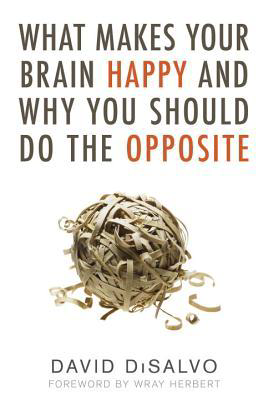Part of the Casswiki article series Books

What Makes Your Brain Happy and Why You Should Do the Opposite is the first book by David DiSalvo, published in 2011. Based on the findings of cognitive psychology and on evolutionary thinking, it describes the human brain’s blind striving to be in a “pleasant” state, and the faulty thinking and bad decisions this can lead to.
This book covers a bit of everything regarding cognitive biases, heuristics, and more generally the ways our brains can flop, but is somewhat broader in scope than books that exclusively focus on such matters. This is partly a result of the style of the presentation, and partly because some general strategies are provided for counteracting the problematic tendencies of our brains.
The research findings are related to the central theme of how the brain strives to “be happy”, or in a pleasant state where certainty, stability, and control are perceived. Among the subjects covered are: confirmation bias, certainty bias, framing bias, intentional stance, hyperbolic discounting, obsessive rumination, and counter-factual thinking.
Much of the value of this book is in connecting the insights brought by the research to our everyday lives. The broad picture is covered, with examples and stories to illustrate the points made. While the examples do not show the full implications of the studies mentioned, they are easy to relate to, and can serve as a starting point for further reflection and dot-connecting.
From the introduction:
Years of neuroscience research have led to the current understanding of the brain as a prediction machine - an amazingly complex organ that processes information to determine what’s coming next. Specifically, the brain specializes in pattern detection and recognition, anticipation of threats, and narrative (storytelling). The brain lives on a preferred diet of stability, certainty, and consistency, and perceives unpredictability, uncertainty, and instability as threats to its survival - which is, in effect, our survival.
The problem is that our brains’ evolved capacity for avoiding and defending against these threats - a capacity that has allowed our species to survive and thrive - has slew of by-products, all tightly woven into our day-to-day thinking and behavior. This book will discuss several of them, each of which, ironically, trip and ensnare us while making our threat-anticipating brains “happy.” The pages ahead include explorations as to why:
- We crave certainty and the feeling of being right.
- We rely on memory to buttress that feeling.
- We’re prone to assigning meaning to coincidence, and making causal links with scant information.
- We want to feel in control.
- We try to avoid loss.
- We regulate our moral behavior to feel “balanced.”
- We attempt to circumnavigate regret.
- We generalize when specificity would be more beneficial.
If we could live our lives without bias, distortions, and delusions involved, the world would be truly idyllic. But we can’t, though we’re largely ignorant of this fact. We function much of the time with an air of mystification about why we do what we do, and why we think as we think - not because we are dull-witted. Must the opposite: only a brain advanced enough to engage in complex thought and self-reflection is susceptible to the fuzzy mystification that obscures from view how our minds really work.
– David DiSalvo, What Makes Your Brain Happy and Why You Should Do the Opposite
DiSalvo’s later book Brain Changer (which is recommended along with this book) provides more in-depth information on how we can change our ways of thinking and behaving. It is an exploration of neuroplasticity, metacognition, and how we can use our minds to rewire our brains. This may not change the most basic pitfalls of how our brains are wired to work, but it can change the way our brains and lives have been shaped by bad decisions and ingrained behaviors that are less than optimal.
See also
- Strangers to Ourselves
- Redirect: The Surprising New Science of Psychological Change
- Thinking, Fast and Slow
- You Are Not So Smart
- Brain Changer
